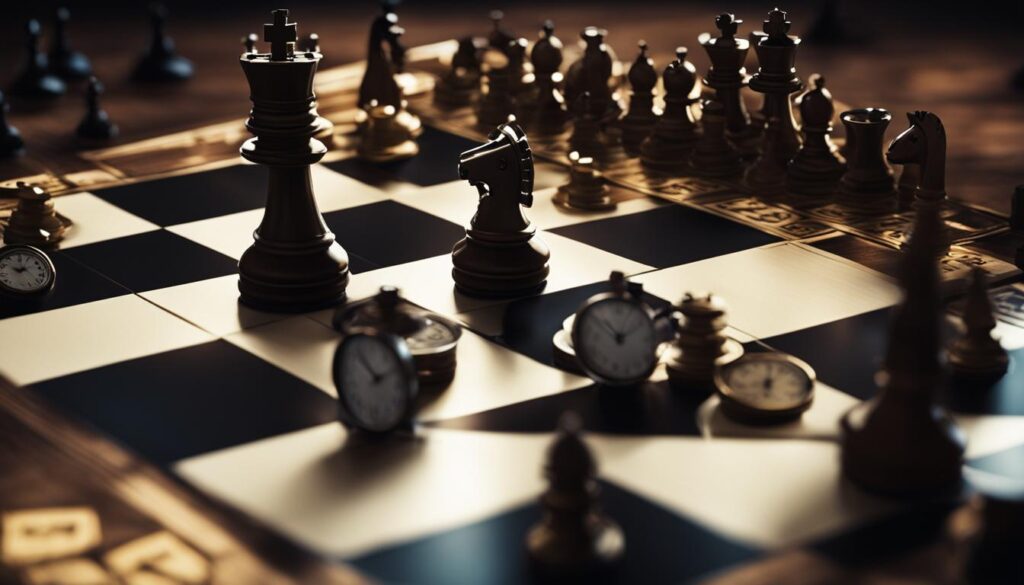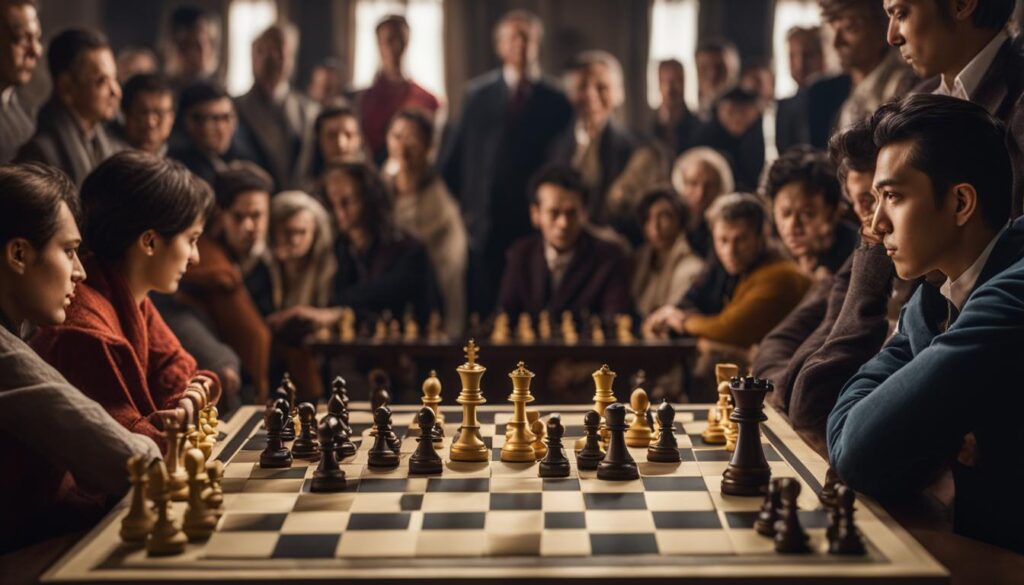We may earn money or products from the companies mentioned in this post.
Chess is a game of strategy, focus, and mental agility. It is not just about making the right moves on the board; it also involves proper planning and execution off the board. One of the critical aspects of successful chess gameplay is efficient chess match scheduling. Proper scheduling not only ensures that you are well-prepared for your matches but also maximizes your performance and strategic decision-making during the game.
In this section, we will explore the importance of chess match scheduling and provide tips to optimize your game through efficient scheduling. Learn how implementing these strategies can improve your strategy and maximize your performance on the board.
Key Takeaways:
- Chess match scheduling is crucial for optimizing your game.
- Efficient scheduling ensures maximum performance and strategic decision-making during the game.
- Proper scheduling ensures that you are well-prepared for your matches.
- Implementing scheduling strategies can improve your overall game.
- Analyze and study your opponent’s gameplay patterns to create a winning strategy.
Understanding Chess Match Scheduling
In every chess tournament or event, scheduling chess matches is a crucial task that requires careful planning. A well-organized schedule can guarantee that all players receive a fair number of games while preventing back-to-back games that can exhaust them.
When creating a schedule, it is necessary to consider factors such as the number of participants, their level of play, and their availability. The schedule should also ensure that players are not paired against the same opponents twice, which can compromise the integrity of the competition.
One common method used in chess tournament scheduling is the Swiss system, which pairs players based on their standings. This strategy ensures that players with similar scores compete against one another, creating a more level playing field. Additionally, this system allows for a predetermined number of rounds, ensuring that everyone plays the same number of matches.
Another method for chess event scheduling is the round-robin system, where every player competes against every other participant. This system is ideal for small events with a limited number of players.
Regardless of the method chosen, a well-structured schedule can create an enjoyable and fair experience for all players involved.
Strategies for Efficient Chess Match Scheduling
Creating a schedule for chess matches can be a daunting task, but with the help of automated tools and organization skills, it can become a streamlined process. Here are some strategies for efficient chess match scheduling:
Automated Chess Match Scheduling
Automated chess match scheduling tools can be a game-changer for organizers who want to save time and effort. These tools can generate schedules quickly and accurately, taking into account factors such as player availability and tournament format.
Chess Match Planner
Being an organized chess match planner is essential for efficient scheduling. This includes keeping track of player information, availability, and preferences, as well as being aware of the tournament format and any other scheduling constraints. By having a clear understanding of all these elements, organizers can create a schedule that works well for all parties involved.
Chess Match Organizer
As a chess match organizer, it’s essential to communicate effectively with players and other organizers to ensure that everyone is on the same page. This includes setting clear expectations, establishing rules and regulations, and addressing any scheduling conflicts that may arise. By staying organized and communicative, organizers can maintain a smooth schedule throughout the tournament or event.
Maximizing Performance through Scheduling
Scheduling can have a significant impact on your overall performance in chess.
Chess game scheduling is more than just organizing matches; it’s about creating a plan that allows you to optimize your game. A well-designed schedule can enhance your focus, preparation, and mental agility, ultimately helping you achieve better results on the board.
Creating a Schedule That Works for You
Designing a chess game schedule that caters to your unique preferences and needs is crucial for maximizing your performance. When creating a schedule, consider the following:
- Your natural peak performance hours. Are you a morning person or a night owl? Design your schedule around the times when you are most alert and focused.
- Your daily routine. Factor in your daily activities, such as work or school, when creating your schedule. Ensure that your chess game schedule does not conflict with your regular routine.
- Game preparation. Make time for game preparation, including studying opponents and reviewing your own gameplay. Plan your schedule to allow for adequate preparation time before matches.
The Importance of Rest and Recovery
Chess is a mentally demanding game, and it’s essential to rest and recover between matches to perform your best. Avoid scheduling matches back-to-back and allow for adequate rest time between games. Additionally, prioritize activities that promote relaxation and stress relief, such as meditation or light exercise, to keep your mind and body fresh and focused.
Adapting to the Unexpected
Even with careful planning, unexpected events can arise that disrupt your schedule. Whether it’s a last-minute cancellation or a delayed game, the ability to adapt to the unexpected is crucial for maintaining your performance. Create backup plans and be flexible in adjusting your schedule when necessary. Additionally, ensure that you communicate any changes to other players or event organizers to prevent confusion or conflict.
Enhancing Strategy with Proper Scheduling
Proper chess match scheduling can be a game-changer for enhancing your strategic decisions during the game. By leveraging scheduling, you can analyze opponents, study their gameplay patterns, and devise winning strategies that exploit weaknesses and capitalize on strengths. Here are some tips to help you enhance your chess strategy with proper scheduling:
- Study your opponent’s strengths and weaknesses: Knowing your opponent’s playing style is key to developing an effective game plan. Look for patterns in their past games and try to identify their strengths and weaknesses. Use this information to schedule matches that will put them in situations where they are more likely to make mistakes.
- Understand the importance of time: Time management is a critical component of chess strategy. When scheduling your matches, be mindful of your opponent’s playing time preferences, as well as your own. This will help you plan a game that maximizes your time, ensuring you have enough time to make sound strategic decisions.
- Be flexible: Scheduling conflicts can arise, and it’s important to remain flexible. Consider rescheduling matches around unavoidable conflicts or working with your opponent to find a mutually agreeable time to play.
By applying these tips, you can use scheduling to your strategic advantage and increase your chances of success on the board. Remember that efficient chess match scheduling is a critical component of mastering your game, so take the time to plan your matches carefully.
Overcoming Scheduling Challenges
Chess match scheduling can be a complex process, and many challenges can arise. Overcoming these obstacles requires strategic thinking and careful planning. The following are the most common scheduling obstacles that you may need to navigate and tips to address them:
Player Availability
One of the most significant challenges when scheduling chess matches is coordinating player availability. This is especially true for tournaments and events with many players. Here are some tips to overcome this challenge:
- Start by determining the availability of each player before the scheduling process begins.
- Create a prioritized list of matches, scheduling the most vital games first, and the least important ones last.
- Take time zone differences into account if you’re scheduling matches for players in different countries or regions.
- Give players enough notice to plan for their matches and minimize last-minute cancellations or scheduling conflicts.
Time Constraints
Another challenge in chess match scheduling is time constraints. Limited time can lead to conflicts and difficulties in finding a suitable schedule that works for all players. Here are some tips to address this challenge:
- Consider using shorter time controls and assigning more time slots for matches if time is limited.
- Work with players to find mutually agreed-upon schedules that fit everyone’s availabilities.
- Be flexible in scheduling, allowing players to reschedule matches, if necessary.
- Use automated scheduling tools to save time and simplify the process.
Conflicts
Conflicts can arise when scheduling chess matches, such as scheduling two players for matches simultaneously or scheduling matches on the same day as other events. Here are some tips to avoid conflicts:
- Double-check schedules to ensure no players have overlapping matches or scheduled for more matches than they can handle.
- Coordinate with other event organizers to avoid conflicts with other events held on the same day or location.
- Be willing to compromise and adjust schedules if conflicts arise.
Planning and executing a successful chess match schedule can be a challenging task, but with proper planning and strategic thinking, you can overcome obstacles and create a schedule that is fair, efficient, and enjoyable for all players.
Conclusion
In conclusion, chess match scheduling is a critical aspect of perfecting your game. By understanding the scheduling process and implementing efficient strategies, you can optimize your performance and enhance your strategic decision-making. Remember to leverage scheduling tools to save time, stay organized, and plan effectively.
Additionally, it’s crucial to stay alert to scheduling challenges like player availability, time constraints, and conflicts. Create contingency plans and communicate effectively with participants to keep scheduling mishaps at bay.
Whether you’re a seasoned professional or a beginner, mastering chess match scheduling will help you dominate the board and reach your full potential. With these scheduling tips and strategies, you’re well on your way to becoming a chess match scheduling expert!
FAQ
What is chess match scheduling?
Chess match scheduling refers to the process of organizing and planning the timing and order of chess matches in tournaments, events, or individual games.
Why is efficient chess match scheduling important?
Efficient chess match scheduling is important because it ensures fair play, maximum participation, and optimal use of time for players and organizers. It can also enhance focus, preparation, and overall performance on the board.
How can I schedule chess matches for tournaments and events?
When scheduling chess matches for tournaments and events, you need to consider factors such as the number of participants, available time slots, and desired format (round-robin, Swiss-system, etc.). It is essential to create a schedule that allows players to compete against opponents of similar skill levels.
Are there any tools available for automated chess match scheduling?
Yes, there are various automated chess match scheduling tools available that can help you streamline the scheduling process. These tools can assist in generating fair pairings, handling tiebreakers, and ensuring efficient utilization of resources.
How can I become an organized chess match planner and organizer?
To become an organized chess match planner and organizer, you need to have a clear understanding of the scheduling process and be meticulous in managing time, resources, and player availability. Utilizing tools and software specifically designed for chess match organization can also help streamline your efforts.
How can scheduling impact my performance in chess?
Strategic chess game scheduling can enhance your performance by allowing you to allocate time for focused preparation, practice, and analysis. It helps create a routine that maximizes your mental agility and ensures you are mentally and physically prepared for each match.
How can proper scheduling enhance my strategic decisions during a chess game?
Proper scheduling enables you to study your opponents’ gameplay patterns, analyze their strengths and weaknesses, and strategize accordingly. By scheduling matches strategically, you can face opponents who align with your preferred playing styles and exploit their vulnerabilities.
What are common challenges in chess match scheduling?
Common challenges in chess match scheduling include player availability conflicts, time constraints, and balancing the desired tournament format with available resources. Overcoming these challenges requires careful planning, communication, and flexibility in the scheduling process.
How can I address scheduling challenges effectively?
To address scheduling challenges effectively, you can communicate and collaborate with players to find suitable time slots, consider alternative formats or venues if necessary, and utilize automated scheduling tools to simplify the process and resolve conflicts efficiently.
Affiliate Disclosure: This post may contain affiliate links. If you purchase through our link, we may receive a small commission, but at no additional cost to you. For more information, please see our Disclosure statement.



